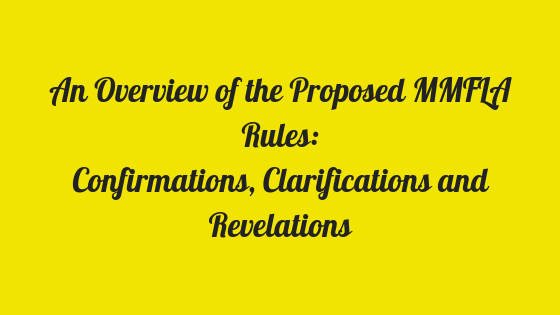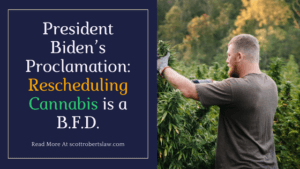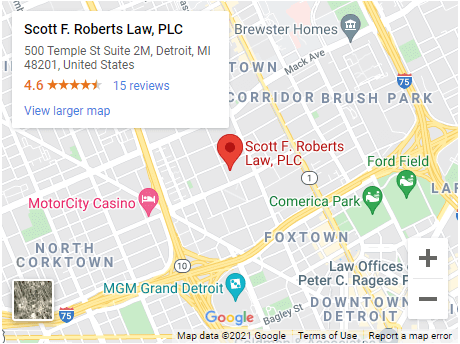The Department of Licensing and Regulatory Affairs released a new set of draft rules to replace the Medical Marijuana Facilities Licensing Act (“MMFLA”) Emergency Rules. While in most cases the proposed rules are in line with the Emergency Rules, there were some substantial, and some subtle, differences between the two.
Below is a summary of the proposed rules broken into three categories. The first category—confirmations—reflects situations where the proposed rules are in line with the Emergency Rules or what LARA has been advising us over the past year. In other words, the old requirements or guidance, many of which were potentially subject to change—are officially confirmed as part of the proposed rules.
The second—clarifications—reflects some minor tweaks between the Emergency Rules and proposed rules. The final category—revelations—lists the instances where the proposed rules made major changes from the previous Emergency Rules and LARA guidance.
Confirmations
- As LARA has been informally advising applicants, licenses are good for one year following the license issuance, as opposed to being calculated on a fiscal year basis.
- As we long suspected, all you have to do to have multiple facilities at the same property is to have “separate business suites, partitions or addresses.”
- LARA can enter your facility at any time, without notice or a warrant, to conduct an inspection.
- Co-located facilities still need to keep each licensee partitioned from other licensees, as well as have separate entrances and exits, inventory and recordkeeping, and more.
- No Coffee Shops. The sale, consumption or serving of food is prohibited at a facility, as is the consumption, use or inhalation or marijuana at a facility. Michigan will have to wait for Amsterdam-style coffee shops.
- Other than state officials, as well as registered primary patients or caregivers, only employees of the licensee are allowed inside the facility, with the exception of a waiting room for non-authorized personnel.
- Samples for safety compliance testing will be physically collected by the safety compliance facility, not a secure transporter.
- LARA can put an “administrative hold” on any marijuana product that is subject to an investigation for an alleged violation of the MMFLA or its rules. Not only that, but LARA can audit any records as well as take “any reasonable or appropriate action” to enforce the MMFLA, giving LARA quite the broad mandate to investigate and take action against licensees.
- Any change in location requires a new MMFLA application.
- Michigan provisioning centers can sell to out-of-state patients who are registered under their own state’s respective medical marijuana programs.
- A Michigan MMFLA application could cost more than $6,000, though I have yet to see LARA do so. The proposed rules state that if the cost of an investigation exceeds this amount, the applicant will pay for the additional cost. It’s not clear what costs are being counted to make this determination though—does the time of the LARA examiners count? If so, what is their “billable rate”?
- The attempted transfer, sale or conveyance of an interest in a Michigan MMFLA license without seeking prior approval is grounds for suspension or revocation of the license.
- What happens when an MMFLA violation is found? LARA has several options: license denial; license limitation; fines; revocation, suspension, nonrenewal or administrative hold on a license; or an order to cease operations. In other words, LARA has many tools in its toolbox to enforce the MMFLA. Fines are limited to $5,000.00 per individual. For companies, it’s the greater of $10,000.00 or daily gross receipts.
- While some variance is allowed between edible marijuana products, the acceptable allowable variation for weight and “homogeneity” (e.g. THC content) is plus or minus 10%.
- Less than one percent owners need to be disclosed, though they are still exempt from submitting a supplemental application. Instead, they must submit their date of birth, government issued ID, or any other documentation required by the act. Any transfer in an interest in a licensee also must be disclosed, and again, there still is no 1% ownership qualifier. This provision is a big deal as it effective prevents public companies from entering Michigan’s cannabis market (See: Michigan’s Mom and Pop Marijuana Market)

Clarifications
- As we have been advising clients, you can use real estate that is encumbered by a mortgage for capitalization purposes. While the MMFLA Emergency Rules stated that no asset used for capitalization could be encumbered, the proposed rules now clarify that assets that are encumbered or have a lien cannot be used except for real estate that is encumbered by a mortgage. This merely codifies LARA’s existing practice of allowing mortgaged real estate to be used for the non-liquid portion of the capitalization requirements.
- The MMFLA license renewal process will not be a cake walk. You must apply for renewal at least 90 days before the expiration of your MMFLA license. LARA has outlined what is required for the renewal process, such as any material changes in information or suitability, owner and municipality attestations, and more. Not only that, but applicants must also pay for the cost of an additional background investigation. As they say, nothing good is free.
- Any addition or removal of owners must still be pre-approved by LARA before such transfer can take place. However, the proposed rules still do not provide much detail on how the approval process will work in Michigan.
- Secure transporters can only hold marijuana product for 48 hours without permission by LARA. Previously, the Emergency Rules stated only that a “reasonable” amount of time a secure transport could hold Marijuana was 48 hours. This would officially put an end to the idea some secure transport companies were considering—the “hub and spoke” business model.
- Under the Emergency Rules, video surveillance systems were only required to have videos of “sufficient resolution.” The proposed rules now clarify that video must have resolution of no less than 720p.
- The testing requirements for marijuana were slightly scaled back so that Michigan safety compliance facilities no longer have to test for terpenes.
- A marijuana product that is to be destroyed or is considered waste must be rendered unusable by grinding and incorporating the marijuana product into a non-consumable solid waste (e.g. food waste, paper waste, etc.) with the marijuana product being less than 50% of the total combined waste product.
- For packaging of edible marijuana products, not only must the packaging still be child proof, but the edible must also be packaged in a resealable, opaque package or container as previously provided in LARA guidance (but not in the MMFLA Emergency Rules).
Revelations
- A brand new rule was announced that would allow for deliveries by provisioning centers. Specifically, a Michigan provisioning center may employ a delivery driver who can deliver to a patient’s home address. An MMFLA licensee must first create a home delivery procedure that is approved by LARA. A home delivery driver is limited to no more than 3 registered patients per trip. The driver is also prohibited from carrying marijuana valued in excess of the patient’s orders.
- MMFLA prequalification status (also known as “Part 1 approval”) does not last forever. While you can sit on a Part 2 application for a little bit, you can’t sit on it forever. A finding of prequalification is valid for one year, unless otherwise determined by the department.
- When collecting batch samples, a safety compliance facility in Michigan must sample not less than 0.5% of the total weight of the batch, and no batch may be more than 15 pounds of marijuana. Accordingly, while the maximum batch size is still 100 plants, the maximum batch size for testing purposes is 15 pounds of cannabis.
- Edible marijuana products must now state their expiration or use-by dates, which is the date that the product would no longer be fit for consumption or the date in which the marijuana product will no longer be optimally fresh.
- Processed marijuana must now have National Poison Control Center information on the label.
- In addition to daily sales limits, the proposed MMFLA rules would impose monthly sales limit on provisioning centers of 10 ounces of marijuana flower per patient. It is not 100% clear if this is calculated on a calendar basis or on a rolling 30-day basis.
- Not only must advertising still not be visible to the general public (i.e. billboards), but an MMFLA licensee must also not advertise in print, broadcast, cable, radio or digital communication except directly to registered patients.
- The handling of all marijuana products, not just processed marijuana products, must now be done in compliance with the Current Good Manufacturing Practice in Manufacturing, Packing or Holding Human Food, 21 CFR 110 (2017). In addition, the storage of any edible marijuana products must be separate from other marijuana products and must also comply with this regulation.
While the above lists are not exhaustive, they highlight key changes as well as similarities between the MMFLA Emergency Rules and LARA’s proposed rules released August 23, 2018. It is important to note that the proposed rules are not final—at least not yet. Under Michigan’s rule making process, the rules must first be subject to public comment before they can be finalized by LARA.




